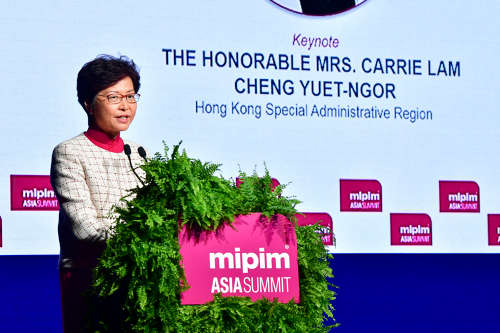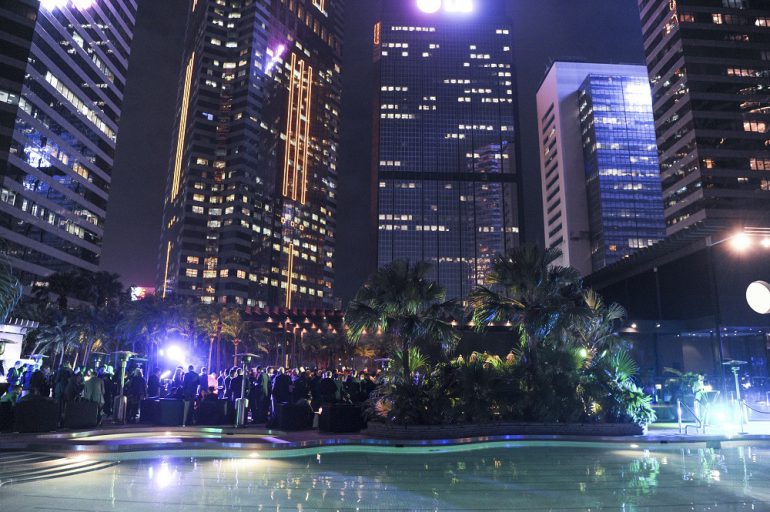Retail in Asia partnered with MIPIM ASIA 2017, the annual property leaders’ summit in Asia Pacific organised by Reed MIDEM, and 28-29 November 2017 in Hong Kong.
The two-day summit featured expert-led conference sessions, premium networking accelerators and an exclusive awards gala dinner.
SEE ALSO : Is it the end of e-commerce?
The 2017 edition of the Summit dissected the industry trends, under the theme “Excelling in a fast-changing world”. Mrs. Carrie Lam Cheng Yuet-ngor, Chief Executive of HKSAR, gave a keynote speech to describe Hong Kong retail landscape, new government regulations and incentives, and the One Belt One Road initiative to boost Hong Kong global outlook.

Retail in Asia opened the retail session moderating the panel entitled “Asian retail property : market overview and challenges”. During the panel, aimed to provide insights about the market opportunities to expand and invest in Asia Pacific, Retail in Asia gave an overview of the current retail landscape by providing market data related to retail real estate, consumers, and goods (RiA InTelligence Department).
The topics covered spanned from the incredible growth of the emerging markets in South East Asia; the impact of internet e-commerce giants that, on the one hand, have played the role of threat and opportunity for offline retailers, and on the other hand, are slowly expanding into offline experience; another topic characterizing the debate was the sharing economy together with the pop-up store trend; the change of retail experience towards lifestyle and entertainment; and the significant shift in consumption from basic needs to more sophisticated goods especially in China.
The panel was animated by leading players in the Asian retail real estate, namely and Phil Kim, Managing Director of Jerde for Asia Pacific; Fung Maureen, Executive Director of Sun Hung Kai Properties; and Nicholas Bradstreet, Shareholder & Managing Director of Savills (Hong Kong).
Phil, with his architectural background, opened the panel discussion by presenting examples of retail spaces setting trends in the contemporary urban landscape all over the world. Phil explained how retail can be used to rejuvenate the urban space and naturally blend into the existing city landscape to create harmony.
Particular attention was devoted to Apple, that earlier this year, announced it would reinvent its retail stores, and revamp its traditional glass cubes by turning them into lifestyle spaces, where design plays a major role in creating a branded customer experience. It did happen with the store in Chicago, which creates a united experience with the city landscape.

The new Apple retail stores conceived as ‘town squares’ represented the kick-start to the ongoing discussion on the future of the offline retail store in different sectors boosted by the increasing sales revenues coming from e-commerce. The store of the future is envisioned as a place of encounter between brand and potential customer, which does not necessarily aim to display the products but to create a genuine interaction instead.
Maureen enriched the discussion with her long experience in strategic planning, development and management of investment portfolio, particularly for retail malls in Hong Kong and China. She brought in her experience in coordinating impactful projects such as the Shanghai IFC Mall IAMP and the upcoming International Trade City project.
She provided the audience with an understanding of the development of shopping mall in China and the attention to customer experience, especially for the luxury brands.
Nicholas, with his 31 years of property experience, 27 of which in Hong Kong, and in the provision of real estate services, enlightened the audience with insights regarding the markets to keep an eye on, which are definitely Hong Kong and China, but also Indonesia, Thailand, Vietnam, Philippines, which have seen a great development in the recent years. Nicholas also explained how to choose between investing in shopping malls and high-street shops based on the characteristics of the brands and the KPI for expansion in Asia, and how design and careful planning of the space play a major role, particularly in Hong Kong.
Additionally, Nicholas highlighted the advent of sharing economy in its different facets, from retail to hospitality, and pointed it out the need to deepen the understanding of these new stakeholders.
The panel concluded with the understanding that while retailers are wondering if in the digital era they still need retail stores, and are opening their own .com, and exploring partnerships with market places, internet giants such as Amazon and Alibaba are looking at ways to expand offline, and digital platforms like Tencent are working on ways to drive traffic to retail stores.
This is symptomatic of a shared understanding that the retail store will still play a major role in the retail industry, however, there are no clear directions into its transformation. Retail players are working towards the improvement of in-store customer experience, and the development of an omnichannel strategy, and the advent of new technology such as AR and VR seems to be accelerating the O2O trajectory.
The two-day programme also discussed topics such as: co-working space, fast retailing vs. luxury, experiential retail, the role of shopping centres and their revival through F&B and entertainment, sustainability, residential and housing infrastructure, hospitality, with a particular focus on the emerging markets.

Source : MIPIM
Particular attention has been devoted to successful examples of new retail experience from all over the world. Among the innovative retail projects, the first food theme-park in the world recently opened in Bologna (Italy), which was presented as sustainable project to value the local F&B culture. The park named FICO Eataly World is 2 hectares of farms, factories, classrooms, restaurants, and markets, where visitors can have an immersive experience of Italian food culture, and engage into a journey from production to consumption aimed to forge knowledgeable and aware consumers.
FICO is part of EATALY, group established in 2006 by Oscar Farinetti and operating worldwide as a distribution and catering chain of typical Italian food products. The Group has recently opened outlets in Asia, and it is now present in Japan and Korea.

Dr. Alessandro Bonfiglioli, General Manager at CAAB, part of the EATALY project, shared his view on the potential of FICO as “an excellent entrepreneurial project with a big international significance”, but also as a way to create “value for all stakeholders” and “a tremendous opportunity for our country,” he said.
The project collected the enthusiasm of the audience and it seemed to be recognized as a sustainable business model to value local products and communities. Shall we expect a FICO project in Asia? We will find out soon.
SEE ALSO : REPORT: Keys to a successful foreign F&B expansion in China
Another interesting aspect of the conference was to understand how Asia is relevant to the world not only as a market, but also as a place with potential investors interested in expanding in countries such as Europe, U.S., and Russia.
The conference gathered Asian entrepreuneurs interested in investing abroad. Besides UK, which seems to be the preferred destination, Italy, and more specifically Invest in Tuscany, provided potential investors with an overview on property opportunities in Italy, for either residential and hospitality projects, but also for retail. This latter, raised interest because of Asian brands willing to establish themselves in the global fashion system, and link their image to iconic cities like Florence.
Filippo Giabbani, Executive Director of Invest in Tuscany, explained how in the recent years, foreign investments in Italy have seen an increase and how government is working towards a way to attract more in order to internationalize their population as well. Filippo highlighted how fashion in particular represents a driving force for Italia economy and how cities like Florence owe their popularity to events like Pitti Uomo.
Overall, the conference has pointed it out the main issues faced by retail and real estate players, the panel discussions worked as a platform to understand changes in the industry from different perspectives and work together to achieve common goals.
MIPIM Asia is part of the renowned MIPIM series of events, which includes MIPIM UK, MIPIM Japan and the MIPIM flagship event in Cannes, France, a four-day exhibition, conference and networking event with more than 23,000 international attendees. Retail in Asia is looking forward to partner with the next editions.
If you have any questions regarding this topic contact our InTelligence Team.




